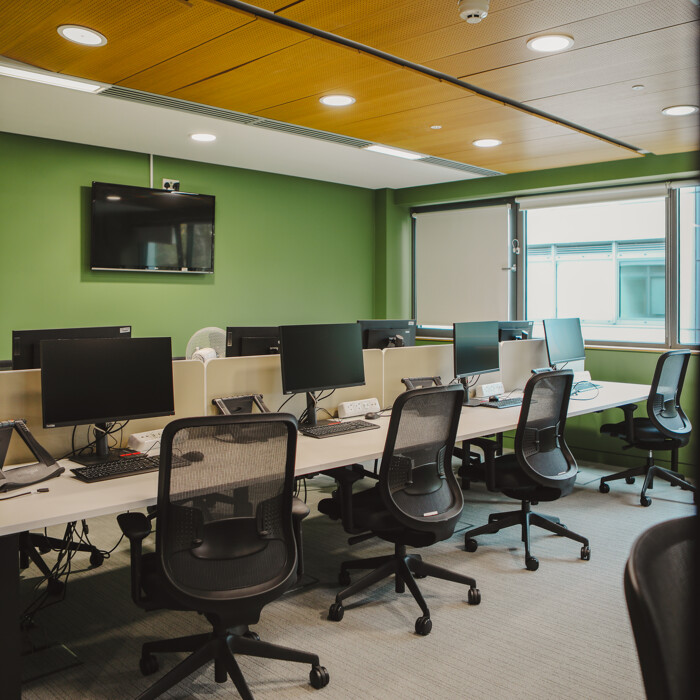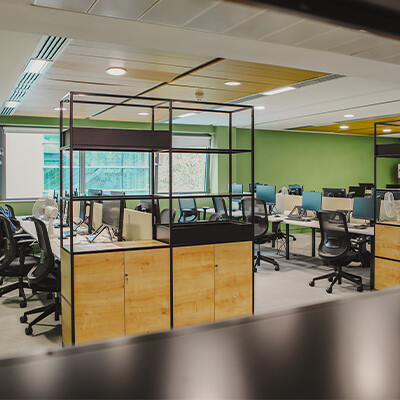
Professional Doctorate in Health Practice - DHealth
Currently viewing course to start in 2025/26 Entry.
The Professional Doctorate in Health Practice (DHealth) is a part-time multi-professional programme leading to a doctoral award. It will enable you to advance your skills, knowledge and practice through research engagement....
- Level Postgraduate Research
- Study mode Part Time
- Award N/A
- Start date September 2025
- Fees View course fees
- Subjects
- Location City South
This course is:
Open to International Students
Overview
The Professional Doctorate in Health Practice (DHealth) is a part-time multi-professional programme leading to a doctoral award.
It will enable you to advance your skills, knowledge and practice through research engagement. You will be an experienced practitioner seeking to develop your research capacity, transform practice and make a direct contribution to knowledge in your professional environment.
You will benefit from being able to work within, and study alongside, a multidisciplinary team of experienced researchers and health professionals. The course draws on the considerable expertise and reputation in health professions development, education and practice- focused research in our Faculty of Health, Education and Life Sciences. The course is suitable for practitioners (including educators) from diverse backgrounds including, but not limited to, nursing, midwifery, public health, radiography, speech and language therapy and other allied health professions.
What's covered in this course?
This course is designed for experienced practitioners seeking to develop their research capacity, advance their practice and influence service improvements in their work environment. You will study alongside your professional role. Your current ‘professional practice’ may be in the university (as a health practitioner educator).
Not sure which BCU Health or Education doctoral degree to go for? This decision tool can help you think about whether a professional doctorate (DHealth or EdD) or traditional PhD (in Health or Education) would be most appropriate for you.
Programme structure
A period of structured learning activity and assessment (‘module stage’) is followed by independent doctoral inquiry and the production of a research thesis.
Year 1 – modules
- Critical Perspectives 1: Context, Policy & Health Practice
- Critical Perspectives 2: Knowledge to Care
Year 2 - modules
- Research Practice
- Pilot Inquiry (Health)
The DHealth modules support the development of knowledge and skills for doctoral level professional practice, including critical thinking, and synthesis of knowledge and practice. You will explore contexts for health practice: policy, professional identities; research methods and methodology; evidence appraisal & literature review; knowledge mobilisation and co-creation. You will also have the opportunity to conduct a pilot study on an element of your research topic. Through your work in the modules and with the support of a Personal Tutor, you will generate and refine a plan for your research thesis.
Years 3-5
Thesis stage: with support of an expert supervisory team, you will pursue a piece of independent research resulting in a thesis (50000 words). This stage begins after successful completion of the module stage- usually in Term 2 of year 3.
I am exploring the communication strategies between podiatrists and their patients who may be at risk of venous insufficiency, to encourage them to engage in more exercise.
I come from a very varied professional background, having been a teacher, a police officer, a fully qualified sports therapist, and running my own successful foot health business!
I particularly love studying my course at BCU as a mature student: I can fully value the university’s nurturing environment, designed to accommodate the balance between my academic pursuits and my life’s obligations. The availability of cutting-edge research opportunities in health, combined with flexible study arrangements and collaborative endeavours means my time at BCU is fun and inspiring.
Debbie, DHealth researcher
Why Choose Us?
- Module delivery designed to meet the learning needs of busy health practitioners through focused attendance in a small number of focused on-campus days (typically 3 days per module), supported by online learning activities and resources.
- Expand your understanding of policy and practice in a multi-professional learning community
- Advance your appreciation of research techniques and methodologies with a focus on relevance for investigating your own area of practice
- Carry out significant independent research whilst remaining in your practice area
- In the research stage, you will receive individual support and guidance from our team of supervisors, meeting on a regular basis to review your progress and plan your next steps
- Benefit from being part of a wider doctoral and researcher community in our Faculty, with a strong focus on practice-relevant research and knowledge implementation
OPEN DAY
Join us for an Open Day where you'll be able to learn about this course in detail, chat to students, explore our campus and tour accommodation. Booking isn't open for this event yet, register your interest and we'll let you know as soon as booking goes live.
Next Event: 28 June 2025
Research Interests
Research Interests
Research in health-related practice in our Faculty is led by the Centre for Social Care, Health and Related Research (C-SCHaRR).
There are four designated clusters within the C-SCHaRR centre representing cross-cutting research themes of relevance for more than one area of professional practice:
- Knowledge2Care –concerned with knowledge mobilisation, co-creation, patient and public involvement and engagement, implementation science (all DHealth students benefit from insights from this cluster, as its researchers lead on the Critical Perspectives 2 module)
- Family, Gender & Health –gender and health; children and young people’s health; family and health experiences
- Person-Centred Ageing -research to support and improve quality of life for older people and those with dementia; work with and on all settings including community, hospital, care homes, prisons.
- The Elizabeth Bryan Multiple Births Centre – a partnership with the Multiple Births Foundation (MBF) which carries out research on all aspects of multiple births.
Here are some examples of current or recent work that has significance for health practice, undertaken by researchers in C-SCHaRR:
- MR imaging to predict neurodevelopmental impairment in preterm infants (Prof Merryl Harvey)
- Communicating endometriosis: health professionals’ experiences (Dr Annalise Weckesser)
- Eczema mindlines (Prof Fiona Cowdell)
- Enhancing dementia care and support in prison populations (Prof Joanne Rybacka-Brooke)
- Investigating burnout in nursing-home nurses (Catharine Jenkins)
Fees & How to Apply
UK students
Annual and modular tuition fees shown are applicable to the first year of study. The University reserves the right to increase fees for subsequent years of study in line with increases in inflation (capped at 5%) or to reflect changes in Government funding policies or changes agreed by Parliament. View fees for continuing students.
Award:
Starting: Sep 2025
- Mode
- Duration
- Fees
- Part Time
- 4-7 years
- £2,503 in 2025/26
International students
Sorry, this course is not available to International students.
If you’re unable to use our online application form for any reason, please email Research.Admissions@bcu.ac.uk.
You must complete a DHealth personal statement/research proposal and upload this as part of your application. Please note that we will not be able to process your application without having received your DHealth personal statement/research proposal.
Entry requirements
UK students
| Essential |
|---|
|
Professional doctorates are designed for mid-career and senior professionals who have previous higher level study, and significant professional experience. |
|
The emphasis is on developing links between theory and professional practise through an extensive process of reflective and reflexive learning. |
|
Professional doctorates are not designed as a teaching qualification; rather they provide evidence of advanced study and research in a relevant education area. |
Research proposal
As part of your application, you are required to upload a personal statement / proposal. Due to the developmental nature of this course, there is no need to provide a comprehensive research proposal at application. However, you must outline your practice and research interests in one-two pages:
- Current area of practice: Describe your professional role and –if relevant – how it has developed. Identify the setting in which you currently work.
- Research interests: what aspect of your role / practice are you interested in investigating? What experience or involvement in research activities have you had?
Course in Depth
Level 7 modules
In order to complete this course you must successfully complete all the following CORE modules (totalling 60 credits):
Research Practice 60 credits
Level 8 modules
In order to complete this course you must successfully complete all the following CORE modules (not credit bearing as Level 8 /research modules):
Critical Perspectives 1: Context, Policy & Health Practice
Critical Perspectives 2: Knowledge to Care
Pilot Inquiry (Health)
Thesis
In order to complete this course a student must also successfully complete:
Research Thesis
Download course specification
Download nowProgramme structure
A period of structured learning activity and assessment (‘module stage’) is followed by independent doctoral inquiry and the production of a research thesis.
Year 1 – Modules
- Critical Perspectives 1: Context, Policy & Health Practice
- Critical Perspectives 2: Knowledge to Care
Year 2 - Modules
- Research Practice
- Pilot Inquiry (Health)
The DHealth modules support the development of knowledge and skills for doctoral level professional practice, including critical thinking, and synthesis of knowledge and practice. You will explore contexts for health practice: policy, professional identities; research methods and methodology; evidence appraisal & literature review; knowledge mobilisation and co-creation. You will also have the opportunity to conduct a pilot study on an element of your research topic. Through your work in the modules and with the support of a Personal Tutor, you will generate and refine a plan for your research thesis.
Years 3-5
Thesis stage: with support of an expert supervisory team, you will pursue a piece of independent research resulting in a thesis (50000 words). This stage begins after successful completion of the module stage- usually in Term 2 of year 3.
Employability
Employment opportunities
After you've completed this course, you will be able to make informed judgements on complex issues in specialist fields, often in the absence of complete data, and be able to communicate your ideas and conclusions clearly and effectively to specialist and non-specialist audiences.
You'll also continue to undertake theoretical and/or applied research and development at an advanced level, contributing substantially to the development of new techniques, ideas, or approaches.
The course will also give you the qualities and transferable skills necessary for employment requiring the exercise of personal responsibility and largely autonomous initiative in complex and unpredictable situations, in professional or equivalent environments.
The Professional Doctorate Health Practice degree has been designed to help you advance your career in your area of professional practice through engagement in practice-focused research. The project /knowledge that you produce through the DHealth is also intended to be of benefit to your employment setting due to the focus on change and improvement. You will demonstrate advanced transferable skills such as managing bodies of evidence; designing and implementing projects; communicating high-level knowledge to diverse audiences; forming solutions to complex problems; exercising integrity.
Doctoral level qualifications are increasingly recognised in clinical and health related career pathways. You might move into a research –focused role in your practice setting, including managing research programmes; lead on mobilising knowledge into practice; or build on your experience to promote improvements in practice. For those based in higher education, a doctoral qualification is increasingly required for career development in health practitioner education roles.
The Faculty is a leading provider of healthcare education in the region, with strong and long-established links to practice.
Facilities & Staff
Our PGR Hubs are designed to be a base for you throughout your postgraduate degree. These spaces are designed to support you to research, study, collaborate and network, as well as grab a well-earned cup of tea whenever you need!
Our PGR Hub at City South Campus has been recently refurbished to provide optimised facilities for PGR students. It is located in room SCT237 in the Seacole Building, where you’ll find:
- Bookable PGR hot desks: 22 networked workstations, allowing you to connect your laptop, two desktop PCs and two accessible/standing desks
- Kitchenette area with fridge and microwave, and teabags, coffee and sugar available to the PGR community courtesy of the Research Office
- PGR social and collaboration space
- Day-use lockers
- Meeting rooms with movable acoustic screens
- Two 2-4 person acoustically secure meeting pods.
Our staff
Dr Kate Thomson
Associate Professor
Dr Kate Thomson is Director of Postgraduate Research Degrees for Health and leads on all aspects of recruitment, oversight and student experience for PhD (Health). She is also a member of the Public Health & Therapies department. Kate completed her postgraduate study at the University of Birmingham with a PhD on learning disability...
More about KateDr Anne Robbins
Senior Lecturer, Public Health
Anne's background is in public health and health promotion, on research based projects at a local, regional and national level. This has been within the NHS, Local Authorities, BBC and National Charities. She has undertaken a wide range of research and consultancy appointments on health promotion and public health which have focused on...
More about AnneProfessor Fiona Cowdell
Professor of Nursing and Knowledge Mobilisation
Fiona Cowdell joined Birmingham City University in October 2016 as a Professor of Nursing and Health Research. Fiona is National Institute of Health Research Knowledge Mobilisation Research Fellow (June 2016 – May 2020). She is a graduate of Oxford Brookes University with a doctorate from Bournemouth University. As a registered nurse she...
More about FionaProfessor Judith Dyson
Professor in Implementation Science, Deputy Director of the Centre for Social Care, Health and Related Research (C-SCHaRR)
Judith Dyson joined Birmingham City University in October 2020 as a Reader in Healthcare Research and Implementation Science. She is a registered general and mental health nurse and a chartered psychologist and has worked in many clinical and management roles in the NHS.
More about JudithProfessor Joanne Brooke
Director of C-SCHaRR
Professor Joanne Brooke is an Adult Nurse and Chartered Health Psychologist. Joanne has a worked across clinical specialities as a nurse including surgery, orthopaedics, emergency care, neurology and stroke in both the NHS and private healthcare settings. The accumulation of clinical posts included that of Nurse Consultant in Dementia Care for...
More about JoanneDr Elizabeth Bailey
Associate Professor and Director of the Elizabeth Bryan Multiple Births Centre
Elizabeth Bailey joined BCU in February 2021 as Associate Professor and Director of the Elizabeth Bryan Multiple Births Centre. Liz became a registered Midwife in 2004 and worked clinically before developing an interest in research. Liz worked in clinical research roles before completing her Doctorate and then working as a Clinical Academic Midwife...
More about ElizabethProfessor Kerry Gaskin
Kerry joined BCU in January 2024 as the first Professor of Congenital Cardiac Nursing in the UK. Kerry studied at North Birmingham College of Nurse Education, becoming a Registered General Nurse in 1992. She is a graduate of Oxford Brookes University with a BA (Hons) in Paediatric Nursing (1996); an MSc in Advanced Practice (Nursing) from...
More about KerryDr Thomas Hopkins
Senior Lecturer in SLT, Research Coordinator and Deputy Chair
Tom is a psychologist who teaches the psychology strand that exists across several modules within the BSc and MSc Speech and Language Therapy degree course. This includes aspects of developmental psychology, social and cognitive psychology as well as applying psychotherapy to speech and language therapy practice. Having gained a distinction in...
More about ThomasDr K Louise McKnight
Senior Lecturer in Radiography
Louise is a Diagnostic Radiographer who worked in clinical practice for many years and brings that experience to vocational degree teaching in a higher education setting. Her research interest is the pedagogy of research in radiography, for which she continues to develop her Doctoral work on an innovative qualitative data collection and analysis...
More about K LouiseDr Andrea Page
Associate Professor
Andrea is a registered nurse for people with learning disabilities, with 30 years plus experience in this field. Prior to joining Birmingham City University in 2000, she was a community nurse for people with learning disabilities. Throughout her career she has always had an interest in how challenging behaviours are managed (and has written...
More about AndreaDr Anne Robbins
Senior Lecturer, Public Health
Anne's background is in public health and health promotion, on research based projects at a local, regional and national level. This has been within the NHS, Local Authorities, BBC and National Charities. She has undertaken a wide range of research and consultancy appointments on health promotion and public health which have focused on...
More about AnneProfessor Annalise Weckesser
Professor of Medical and Feminist Anthropology
Annalise came to the UK in 2007 from Canada to undertake doctoral studies in Medical Anthropology at the University of Warwick's School of Health and Social Studies, where she was a Warwick Postgraduate Research Fellow.
More about Annalise



